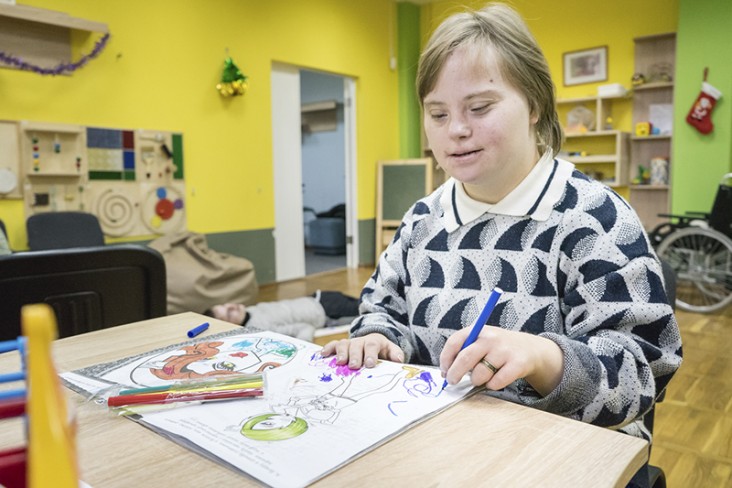Speeches Shim

Despite signing the UN Convention on the Rights of Persons with Disabilities in 2015, Belarus lacks critical services for its estimated 25,000 children living with disabilities. Recognizing the importance of this issue, USAID’s Community Connections program exposes Belarusian professionals to American best practices on providing social services for vulnerable groups, including children and youth with disabilities.
One such Belarusian professional, Taisia Zenova, Deputy Director of the City Social Service Center, visited the United States in 2016 as part of the Community Connections exchange program, an experience that has changed her life and led to much needed help for children living with disabilities. After participating in a cohort on rehabilitation services for youth and children with disabilities, Taisia decided to apply the lessons she learned to implement innovative services for the rehabilitation of young people with severe and multiple developmental disabilities in Belarus.
"If a person wants to succeed the main resource for that is to believe," Taisia explained.
Taisia presented her ideas and acquired the support of local and state authorities, USAID, and the Belarusian Association for Assistance to Disabled Children and Young People with Disabilities (BELAPDIIMI). In September 2017, Taisia opened a specialized center offering free comprehensive social and rehabilitation services to young people with disabilities. Based on a similar institution in Reno, Nevada, the Center enables youth to leave the confines of their homes and provides their parents the ability to work. Minsk city leadership and representatives of other centers for social services attended the center’s opening ceremony and recommended all governmental social agencies take similar approaches by opening such centers in their districts.
Since opening in 2017, the Center has achieved great success and received positive feedback from the families using its services. It has been repeatedly featured in the media, at round tables, seminars, by employment and social protection bodies, by territorial centers for social services in Minsk, and in other regions of Belarus. The Center’s success has also led the Belarusian professional community to acknowledge the impact that high-quality social rehabilitation services can have on youth. Belarus’ Ministry of Labor and Social Protection commended Zenova on the effectiveness of adapting U.S. best practices to serve Belarusians with disabilities.
Today, Taisia consults the state day-care centers for people with disabilities. Taisia also continues to teach and supervise the training of social workers at the City Re-training Institute, where she shares her experience creating the Center and discusses international best practices of working with people with disabilities. She serves as a consultant for professionals across Belarus seeking advice on how to open centers based on her model.
In February 2020, Taisia and her team initiated the opening of the second specialized center for young people with mental disorders. This center resources allow hosting about 15 young people who get professional care.
USAID supports Belarus’ people with disabilities through its partnership with BELAPDIIMI, a Belarusian NGO creating equal opportunities for disabled children and youth, including the Art for Inclusion of People with Disabilities project implemented by BELAPDIIMI.
Since USAID started administering the program in 2006, over 700 Belarusian professionals have graduated from its Community Connections programs and have been exposed to American best practices and culture through these exchanges across U.S. communities. Community Connections empowers 60 participants a year to adapt lessons in leadership and entrepreneurship to tackle social and economic development challenges in Belarus. Taisia's successes provide a sterling example of the effectiveness of USAID's Community Connections program.

Comment
Make a general inquiry or suggest an improvement.